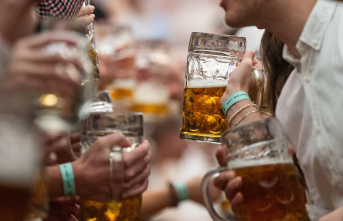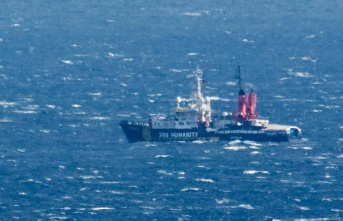Who is the fastest on the roller coaster? For decades, this question played no role. Depending on the design, the passengers sat in the same train, boat or car. For Marco Hartwig, however, this question is now becoming more and more crucial. "Higher, faster, further is no longer the most interesting point," says the roller coaster project manager at Maurer Rides in Kirchheim near Munich. "It's about the individual character of the ride."
Instead of racing with each other, roller coaster fans are racing against each other more and more often. So-called spike coasters can accelerate and decelerate adrenaline fans themselves within a certain range - and thus fight for the best time on the track. The first roller coaster of this type, the "Sky Dragster", was opened in the Allgäu Skyline Park in Bad Wörishofen in 2017. It is now also available in Italy and on a cruise ship in the Caribbean. According to Hartwig, the next ship with Spike Coaster on board is scheduled to depart on November 6th.
According to Janek Schwedek, spokesman for the Association of German Leisure Parks and Leisure Companies (VDFU), individualization has long since found its way into the leisure industry "as a social megatrend". In the future, rides would be “made accessible to ever broader target groups through setting options”. This also applies to roller coasters. "Of course, the more people share a driving experience through connected wagons, the more difficult it is to realize."
In Germany's largest amusement park, the Europa-Park in Rust near Freiburg, they opt for a middle course: voting instead of racing. Since 2014, the twelve passengers per train on the "Arthur" roller coaster have been able to use a button in the safety bar to decide in which direction the roller coaster should go and where it should turn. "Depending on the result, the car then turns accordingly and one of several driving profiles is selected," says Maximilian Roeser, spokesman for the manufacturer Mack-Rides in Waldkirch im Breisgau.
Such interactive rides are "in fact more and more in demand," says Petra Probst, spokeswoman for the Association of Leisure and Amusement Facility Manufacturers (VDV). "Higher, faster, further has by no means gone out of fashion, but the only thing that is in demand has long since gone." In addition to interactive offers, rides with virtual elements are also playing an increasingly important role.
If you want to ride an interactive roller coaster alone or in pairs, you will inevitably have to put up with one disadvantage: you sometimes have to wait a long time for the start - this also applies to the "Sky Dragster" in the Allgäu Skyline Park. "Of course, the capacity is not that high with two motorcycles at the moment," says spokeswoman Diana Edmaier. "Two guests can sit on one motorbike. There can be longer waiting times here, even on busy days."
But you can design each ride differently, emphasizes roller coaster project manager Hartwig. As a result, these rides are also interesting for business models outside of amusement parks. "Because you want to drive it several times, it binds visitors more." If you charge money per trip, you can earn more with it. Therefore, in addition to cruise lines, hotel parks have already inquired about this type of roller coaster.
It is unclear whether such interest will result in concrete orders for German manufacturers. After closures during the Corona pandemic, amusement parks and showmen are now struggling with rising energy prices and inflation. "The situation is dramatic," says VDFU spokesman Schwedek. "There is no lack of willingness, but simply the opportunity to invest due to the exploding costs despite serious and successful management." Due to rising energy costs, there are sometimes additional costs “in the millions”.
This situation is "threatening to exist" and threatens "particularly in rural areas entire tourist regions in the catchment area of the leisure facilities," emphasizes Schwedek. Politicians must therefore relieve the companies.
This uncertainty has not yet reached the German manufacturers of roller coasters and rides. "Fortunately, the amusement parks were not discouraged by the effects of the pandemic and continued to invest," says VDV spokeswoman Probst. "However, I am not yet able to assess what could still be in store for us as a result of the effects of an energy and global economic crisis that is currently looming."












